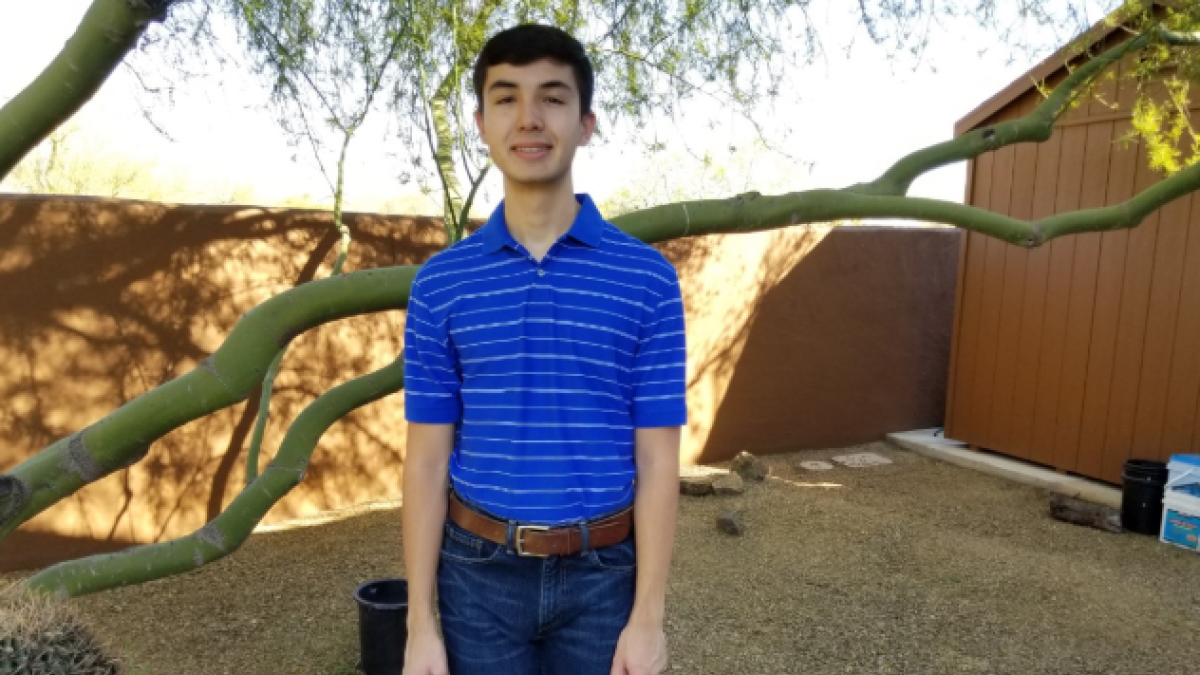Graduating history undergraduate to pursue military career

Nathan Callahan is graduating this semester with his bachelor's degree in history and a certificate in political history and leadership. Photo courtesy of Nathan Callahan.
Editor's note: This story is part of a series of profiles of notable spring 2020 graduates.
Nathan Callahan started out as an engineering student at Arizona State University, but discovered the degree wasn’t for him. After a challenging first year, Callahan was gearing up to join the Navy, but when he received a New American University President’s Scholarship, he decided to change majors and take advantage of the opportunity to continue his education.
“I decided I would turn to the other subject that had always interested me and switched into the history program,” said Callahan.
He found his stride as a history major and added a certificate in political history and leadership to his coursework.
In December, Callahan was awarded an internship at the Goldwater Institute in downtown Phoenix, where he worked with the communications department to help promote legislative initiatives and litigation cases.
Callahan is graduating this semester from the School of Historical, Philosophical and Religious Studies, and we caught up with him to ask him about his time at ASU.
Question: What was your “aha” moment, when you realized you wanted to study the field you majored in?
Answer: My "aha" moment didn't come until after my first semester as a sophomore. I had switched into history over the summer and wasn't 100% sure how I was going to like studying it in college versus studying it in high school. After having done reasonably well in my toughest course that semester, HST 321 taught by Dr. T.J. Davis, and quite frankly, really well everywhere else, I knew that I'd made a good choice.
Q: What’s something you learned while at ASU — in the classroom or otherwise — that surprised you or changed your perspective?
A: As far as a class that changed my perspective/surprised me, I would be remiss to not mention AIS 280 taught by Dr. James Riding In in American Indian Studies. Learning about the often tragic history and consequences of major Native American court cases was a bit depressing as one might imagine, but it certainly was a class that was worth my while. It was a major blind spot in my understanding of American history as a whole.
Q: Why did you choose ASU?
A: While I would imagine it would be easier if I was gung ho about the school's pride or a particular strength, the reality is that it represented the best dollar-for-dollar value I could get as far as college goes. Considering where I ended up with my degree, going out of state — and its associated costs — would've been a terrible mistake!
Q: Which professor taught you the most important lesson while at ASU?
A: My most important lesson would have to be from Dr. Donald Critchlow and his lessons on "principled pragmatism." I learned it in a historical context, how politicians had to compromise on ideology and ideals in order to forward ideas that they had to deem more important, but I believe that this is important in life. Some things are not to be compromised on, but it's inevitable that compromises will occur, so make sure they are anchored to larger and more important ideas.
Q: What’s the best piece of advice you’d give to those still in school?
A: It's cliche but, for many people, college will be about failure and not success. I feel that many people don't know how to handle catastrophic failure when they get to college, having performed so well prior to college, and so minor mistakes can snowball into major failures. If or when the time comes, accepting failure, adapting and then creating a new plan for success will be the only way forward.
Q: What was your favorite spot on campus, whether for studying, meeting friends or just thinking about life?
A: In terms of my favorite spots, Noble Library — where I used to work — was always nice. I always used to see a lot of friends there and the book collection was really well put together — now gone unfortunately. If you do end up going there, be prepared to wait in line for a really long time at Starbucks.
Q: What are your plans after graduation?
A: My long-term goal is to commission as an officer in the U.S. Marine Corps. To further this, I enlisted in the Marine Reserves in late-March to help prepare myself mentally and physically. It's been my desire to serve in the military for a very long time and so it's exciting to finally take a concrete step towards service in the military.
More Law, journalism and politics
Can elections results be counted quickly yet reliably?
Election results that are released as quickly as the public demands but are reliable enough to earn wide acceptance may not…
Spring break trip to Hawaiʻi provides insight into Indigenous law
A group of Arizona State University law students spent a week in Hawaiʻi for spring break. And while they did take in some of the…

LA journalists and officials gather to connect and salute fire coverage
Recognition of Los Angeles-area media coverage of the region’s January wildfires was the primary message as hundreds gathered at…

